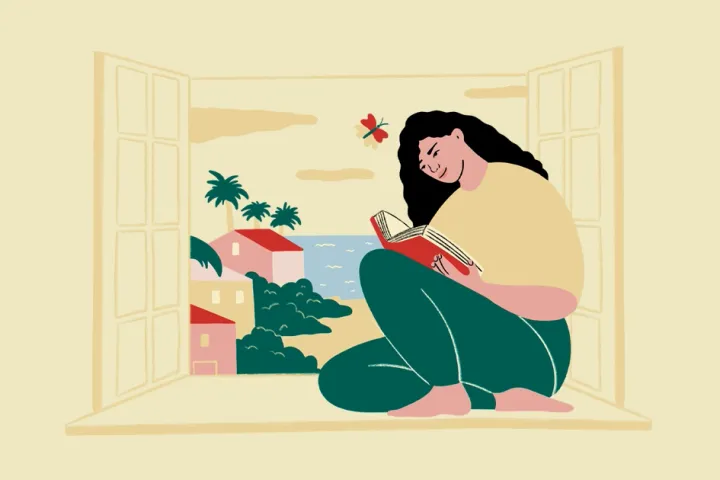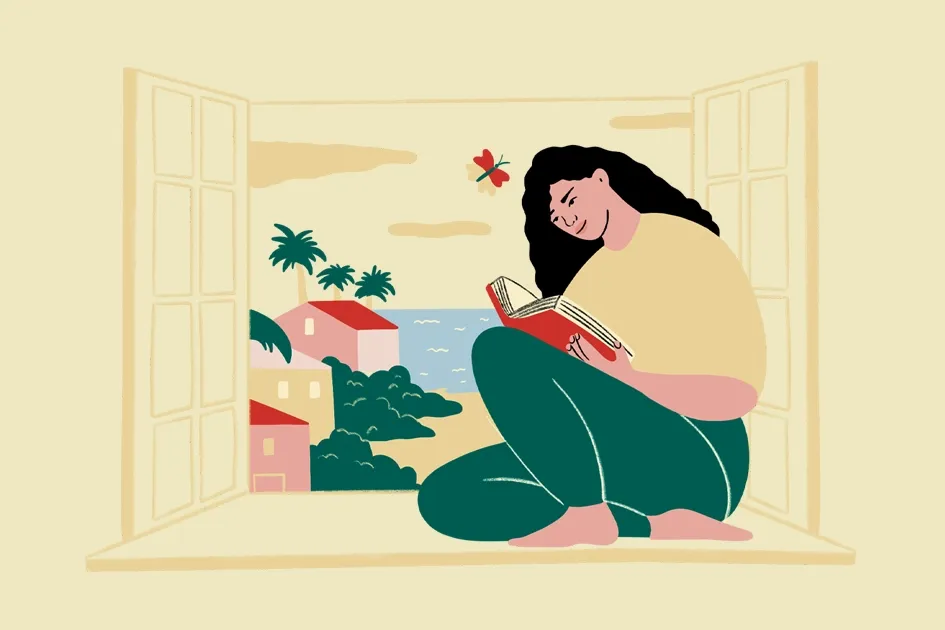With the last cookie batch in the oven, all the shopping, baking, decorating, and cleaning somehow wrapped up ahead of schedule, and for the first time in weeks, things were quiet. A little too quiet, honestly. It was a few nights before Christmas, and I was in full holiday mode, but guests wouldn’t be arriving for a couple of days.
 Illustration by Gemma O’Brien
Illustration by Gemma O’Brien
Then the doorbell rang. My neighbor Vee was dropping off a present, and I welcomed her company, however brief. She handed me the gift bag and seemed ready to rush off (probably neck-deep in last-minute preparations herself, I figured). But when I asked if she’d like to come in, she—to my surprise and delight—accepted. So I set the gift bag on my kitchen counter and then served tea and hot cookies in the living room. Can you picture a more perfect holiday scene?
We caught each other up on work, family, and Christmas plans. It was a lovely conversation. (I even remember joking about how the visit and holiday mugs made me feel like a real grownup.) And then, after we’d been talking for a good while—at least 20 minutes—there was a loud crash in the kitchen.
We were not only startled but also confused, as there were no other people in the house. I don’t even own a pet. But the sound was unmistakable—something had broken, and we didn’t know what or how. After a moment of stunned immobility, Vee and I lunged toward the kitchen. And there on the floor lay the gift bag, still unopened. So much for the perfect Christmas moment.
In a flash, things went from “Hallmark” to awkward. I unwrapped my present and stood there with half of a beautiful ceramic Christmas bowl in each hand. What do you say at that point? Do you mention how much you like the design with the word “JOY” in the center? Or that you would have loved using it every December? Do you laugh? (In a way, it was kind of funny.) Or apologize? (But it wasn’t anyone’s fault.)
Vee wasn’t sure how to navigate this, either—she graciously offered to buy another one, but how could I ever feel good about using a replacement that needlessly cost her double? Fortunately, the bowl wasn’t shattered but had simply split in two, and the pieces seemed easy to align. So, begging Vee not to look for a new one, I assured her I’d take pleasure in attempting a repair.
The next day, with determination, prayer, and several types of adhesive, I set about correcting the damage. Eventually the effort paid off, and I was actually quite pleased with the result: Though the repair may not be 100 percent invisible, you really have to look to find it. So I got to use Vee’s gift on Christmas after all—and also had a good story to go with it.
A few weeks later, while wrapping the bowl for storage (in lots of protective layers), I realized I didn’t want to keep the thing packed away for a year. Its saga was too good. In fact, the “joy” bowl felt a bit like a picture of the previous six months—a disorienting stretch when my family had some glorious highs strewn with arduous lows. More than a few times, I’d felt emotionally confused—Is it okay to be downhearted about a painful situation when a joyous circumstance is happening simultaneously? Is it some kind of betrayal to laugh with a rejoicing loved one while another faces tragedy?
Yet strange as that felt, those incongruities are typical of life on this broken planet. When is joy ever perfect, unmarred by some tragedy—like the empty chair at a holiday table? And how often is adversity totally unpunctuated by comic relief? I bet we’ve all been at funerals where a heartwarming remembrance brings smiles or even a good belly laugh. Ecclesiastes 3:1-8 does tell us that life has many seasons— “a time to give birth and a time to die … a time to weep and a time to laugh; a time to mourn and a time to dance” (vv. 2, 4)—but nowhere does it say those seasons are necessarily distinct.
Consider this story of ultimate mixed emotions, as reported in The Times of Israel: “In a single day, Rabbi Doron Perez found out that his son Yonatan had been shot and injured in the Oct. 7 Hamas terror attacks—and his other son, Daniel, was ‘missing in action’ and presumably held hostage. Only 10 days later, the family went on to hold Yonatan’s wedding, with Daniel’s status still completely unknown.”
In an interview with the Jewish Learning Institute, Rabbi Perez spoke about the conflicting emotions of those weeks. “It’s incredible the contradictory circumstances life puts you in,” he said. “We … had to make a decision whether we would go ahead with our son’s wedding while his brother was unaccounted for.” A comment from Yonatan’s commanding officer helped the family decide. “We’ve got enough difficulties,” he said. “We need simchas [happy occasions].”
Proceeding with the event proved to be the right choice. One guest called it “the holiest, saddest, happiest wedding” she ever attended. For Perez himself, the experience led to a revelation “that it is possible to hold incredible angst, fear, and trembling together with incredible gratitude, happiness, and simcha; the pain doesn’t cancel out the happiness and the curse doesn’t cancel out the bracha [blessing]. The human heart is very expansive, and it’s able to contain both.”
I liked hearing that. It explained my confusion—regarding not just the broken gift but also more consequential situations—and validated allowing myself to hold seemingly incompatible feelings simultaneously. Perez also offered some wisdom for handling such moments: “When we stand under the chuppah [traditional wedding canopy], like all of the joyous occasions of life, I think we’re called upon to put the challenges of life aside and focus on the blessing … The spiritual work [is] to know to what to put away and what to bring out.”
As for my broken bowl, I still don’t understand how it happened. But what I do know is that its misadventure made this gift far more memorable. If there had been no leap off the counter, I’d have loved the “joy” bowl every Christmas season and then returned it to the attic. But the unique debut earned the mended dish a place in my front hall curio cabinet, where I can enjoy it 365 days instead of 30—a daily reminder that it’s okay, maybe even essential, to feel joy in tough times.





